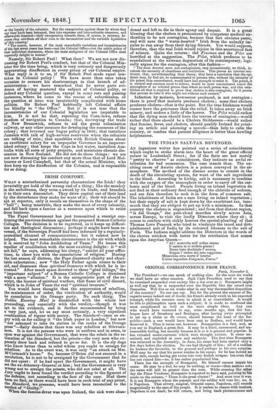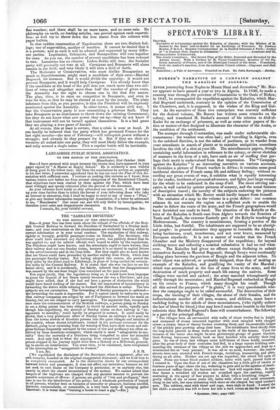ORIGINAL CORRESPONDENCE FROM FRANCE.
Paris, November 2.
The President !—we can speak of nothing else: for the next six weeks we shall have no other concern. Jack Cade Proudhon used to say that he remained suspended over society like a dot over an 1: Bonaparte might as well say that he is suspended over the Republic like the sword over Damocles. Will five or six weeks alter in any way the manifest disposition of the country? No one can say. But for the present the success of Bo- naparte seems indeed out of doubt; his friends already exult in his expected triumph, while his enemies seem to admit it as unavoidable. It would be idle to philosophize upon such a subject; it is made to confound the most complicated as well as the most simple ideas. Any one who would have ventured to say, some months ago, that the bur- lesque hero of Strasburg and Boulogne, after having twice attempted to set up a claim to the crown, should become the head of the Re- public—such a one would have been sent to Bedlam, and would have deserved it. Thus it turns out, however. Bonapartism is a fact, and, as you say in England, a great fact. It may be a blind, unreasoned, and un- reasonable feeling, but exactly because it is so it is general and popular. It has revealed under-currents which were thought extinct. It came un- noticed, and exploded at once and suddenly. The first time Bonaparte was returned to the Assembly, in June, his name had been started only a few days before the election. No one had thought of him: all of a sudden he became the favourite, to the general and perhaps to his own surprise. Well may he say that his power resides in his name; for he has indeed no other title, except having got twice into very foolish scrapes: but even that has not ruined him—no, it has rather popularized him. There lies the strength of Bonaparte. He himself cannot impair his name. He may be a fool, he may be nothing, or worse—that matters not; the name will still be greater than the man. While crossing the other day the Place Vendome, Bonaparte is reported to have said, pointing to his uncle on the column," There is the great elector!" And most true it was. It is not Bonaparte whom the peasant and the soldier will vote for; no, it is Napoleon. That silvery, magical, Oriental name, Napoleon, still sounds magnetically to the ears of the people. It is useless to reason with instinct. Napoleon is not dead; he will return, and bring back plenteousness and
fine weather; and there shall be no more taxes, and no more rain. No philosophy on earth, no leading articles, can prevail against such supersti- tion: as well try to throw down the iron statue from the column with paper bullets. In that sudden resurrection of Napoleonine there are two distinct feel- ings; one of superstition, another of reaction. It cannot be denied aiat it is a protest; and as such it will be adopted and supported by many differ- ent parties. Legitimists, Orleanists, and Bonapartists will vote together for once. As you see the number of present candidates has been reduced to two. Lamartine hills no chance; Ledru-Rollin still less; the Socialist party will generally not vote at alL Cavaignae and Bonaparte will alone remain in the field; and very likely it will tarn a field of battle. The Moderates or Conservatives, who must dislike Bonapartism as much as Republicanism, might start a candidate of their own—Marshal Bugeaud, for instance. But it would divide the majority; it would not prevent Bonaparte, and it would help Cavaignac. You already know that if the candidate at the head of the poll does not reach more than two mil- lions of votes and altogether more than half the number of given votes, the Assembly has the right to choose one in the first five names. The plan, thee, is to raise no competitor to Bonaparte, and even to vote for him, so that he may be elected at once by the people. The plain inference from this, as you perceive, is that the President will be expressly nominated against the Assembly. In other terms, it means civil war. I fear the Conservative party is now committing a grievous fault. They take Bonaparte as an instrument to throw down the existing Goverument; but they do not know what new power they set up—they do not know if that instrument will not be turned against themselves. It is a bad game they are playing, a true game of hazard. At all events, this at least is certain, that a crisis is near at hand. It can hardly be believed that the party which has governed France for the last eight months—the men of February—will relinquish power without a struggle; and already do they prepare for it. But if they see their ad- versaries all united into one party, they will most likely follow the example, and rally around a single name. Then a regular battle will be inevitable.

























 Previous page
Previous page